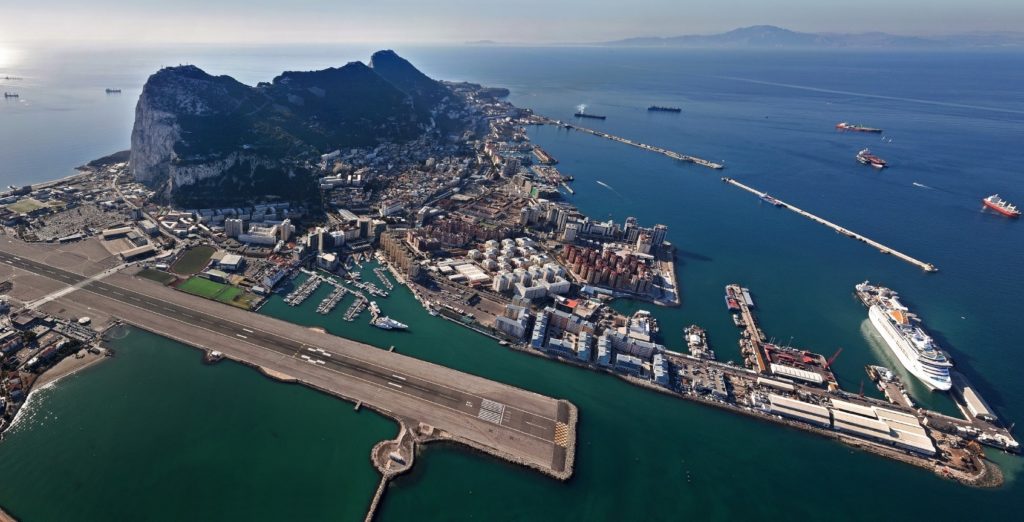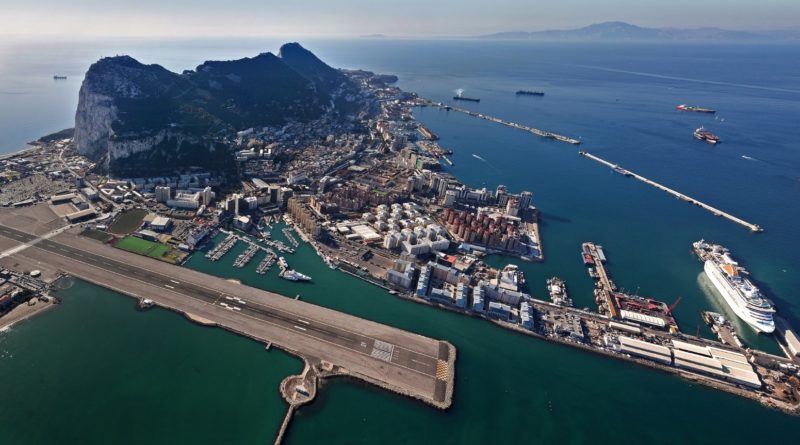Gibraltar after the UK’s exit from the EU: A comparison with Northern Ireland

Gibraltar
Following the United Kingdom’s (UK) exit from the European Union (EU), much debate was focussed on Northern Ireland’s unique position as part of the UK which has a land border with the EU. An interesting point of comparison can be found in Gibraltar, a UK Overseas Territory which shares a land border with Spain and was also a member of the EU. This article considers some of the similarities and differences between the position of Northern Ireland and that of Gibraltar.
The Government of Gibraltar
It is important to state at the outset that there are constitutional differences between Gibraltar and Northern Ireland. Northern Ireland is part of the UK with a devolved government, which has responsibility for transferred matters under the Northern Ireland Act 1998. Gibraltar is a UK Overseas Territory, so the UK Government is responsible for Gibraltar’s external affairs, i.e. foreign relations, which includes its relationship with the EU. Before the UK’s exit from the EU, 70% of Gibraltarian law was derived from the EU, but it was not party to the Customs Union, Common Commercial Policy, Common Agricultural Policy or Common Fisheries Policy. It also was not required to levy VAT. Under the Gibraltar Constitution Order 2006 other matters, including the implementation of EU law, are the responsibility of the Gibraltar Parliament, which is elected, and the Governor of Gibraltar, who is appointed. The Governor of Gibraltar is the head of state, he gives assent to the laws passed by the Parliament, and is responsible (subject to the UK Government) for the conduct of external affairs, defence, internal security, including the police, and some public appointments. As it has responsibility for external relations, the UK Government will negotiate the terms of the/a Gibraltarian EU Exit deal.
Comparing Gibraltar and Northern Ireland
Despite the differences in internal government and constitutional arrangements, there are significant similarities between Northern Ireland and Gibraltar. Like Northern Ireland, there have been disputes over sovereignty in Gibraltar. Both Northern Ireland and Gibraltar have strong economic links with their EU neighbour, including a substantial number of cross border workers. Both voted to remain within the EU during the 2016 referendum and the governments of both jurisdictions made efforts to highlight the practical and political difficulties they would face as a result of the UK’s exit from the EU. Ultimately, both will end up with arrangements which deviate from those which apply in Scotland, England and Wales.
In other ways, Gibraltar’s situation is the inverse of Northern Ireland’s. Their government is more concerned about services than customs, because trade in services underpins its economy. National identity in Gibraltar impacts its future relationship with the EU, not because it is divided, but because the vast majority of its residents share a perception of Gibraltar as a British territory. Although both jurisdictions voted to remain within the EU, 95% of Gibraltar’s electorate voted to do so and no Gibraltarian political party advocated for Leave. Finally, unlike Northern Ireland, the challenge the UK Government currently faces in respect of Gibraltar is not implementing a Protocol which has caused domestic political difficulties; but negotiating a Protocol in the context of international difficulties.
Customs, trade and services
At 2.7 sq. m., Gibraltar is the smallest of the UK Overseas Territories, its value to the UK at the time of the Treaty of Utrecht being its importance as a strategic location – which continues to be the case. Its size means that its economic underpinnings are less diversified than that of Northern Ireland, as there simply isn’t room for heavy manufacturing plant or agriculture on a large scale. Tourism, whilst important, comes through the land border, and the airport’s single runway intersects with the main road towards the land border with Spain.
Gibraltar is outside the EU’s VAT jurisdiction, which allows it to provide VAT-free fuel, so it is frequently used as a bunker port for refuelling purposes. The majority of trade is with the UK, particularly in financial services and online gambling, but Gibraltar accounts for 25% of employment in the Campo de Gibraltar region of Spain, which has a population of over 250,000. So, although Gibraltar primarily trades with the UK, it provides a substantial employment hub for Spanish citizens – while most Gibraltarians work in Gibraltar. Since it was first allocated EU funds in 1990, Gibraltar has received approximately 60 million euros in EU funding. Northern Ireland, by contrast, has received €3bn in the 2014-2020 funding period. Gibraltar has benefited from low tax regimes, the value of which is considerable, albeit more difficult to quantify.
National identity
There is no division, comparable to that in Northern Ireland, within Gibraltar on questions of national identity. Although Spain, as the EU neighbour with which it shares a land border, has repeatedly stated its desire to reclaim the territory, a 2002 Gibraltarian poll rejected a proposal of joint sovereignty with an emphatic 99%. At the time, the UK and Spain had negotiated Gibraltar’s future without including representatives from the Gibraltarian government. The referendum was not recognised by either the UK or Spain, but it was followed by the Gibraltar Constitution Order 2006, which gave more powers to elected Gibraltarian officials (as opposed to the Governor of Gibraltar) and modernised the relationship between the UK and Gibraltar. This was put to another referendum, and accepted by Gibraltar’s electorate.
On 19th January 2021, the Chief Minister of Gibraltar gave evidence to the House of Lords’ European Union Committee and stated, “Whether it is the carrot or the stick, nothing will ever cleave the people of Gibraltar away from the United Kingdom and our Britishness”.
Gibraltar and the EU exit referendum
In Gibraltar, the vote in favour of remaining in the EU was 95.9% – only 823 votes to leave, with a total turn-out of just over 20,000 voters. In Northern Ireland the vote was differently balanced – although the region voted to remain, the vote was 55.8% to 44.2%, with a turnout of 62.7%. The majority of political parties in Northern Ireland favoured the remain position, but a significant proportion of the electorate are represented by parties who supported the UK’s exit from the EU. There are no mainstream political movements in Gibraltar which seek to leave the UK and re-join Spain but, equally, the majority preferred to remain within the EU.
Negotiating the Gibraltar Protocol
The Gibraltar Protocol ceased to apply at the end of the transition period, just as the NI Protocol was coming into force. At the time of writing, there is no agreed instrument to replace it, but the Spanish and UK governments have agreed frameworks which will provide a mandate for treaty negotiations, which are in a preparatory stage. These frameworks outline the areas which will be subject to negotiation. The documents were leaked to a Spanish newspaper, and have been the subject of some discussion in the press. It is important to note that the frameworks have not yet been accepted as a mandate for negotiation by the European Commission. Once this process is complete, negotiations with the UK will begin.
However, some key elements of the framework were outlined by the Chief Minister, Fabian Picardo, both in a statement to the Gibraltar Parliament and when he gave evidence to a House of Lords Committee in January of this year.
The Framework
The Chief Minister confirmed that the framework contained proposals for Gibraltar to form a Common Travel Area with Schengen, which would mean that the land border between Gibraltar and Spain would be much more fluid. On the issue of entry at airports and the harbour, FRONTEX – the EU Borders Agency – would carry out initial checks at the airport and marina. A shared facility, dubbed “the Schengen Shack” would be built close to the airport to carry out secondary checks.
In order to manage the issue of goods, Gibraltar hopes to join a “bespoke” customs union with the EU. This remains a “live issue” in negotiations. The Chief Minister’s view is that, since Gibraltar does not produce goods, for Gibraltar to join the Customs Union, together with all the laws that would come with it, would “literally be a sledgehammer crushing a nut”. Instead, the Chief Minister spoke of applying different parts of the common commercial policy, the common external tariff and other aspects of the customs union. The geographic and economic circumstances of Gibraltar mean that it is important for Gibraltarians to ensure a free flow of goods from the EU, and a frictionless border with Spain. The Chief Minister would not be drawn on the issue of VAT, excise and a level playing field, pointing out that the framework document only established what would be dealt with by the agreement, not what would be agreed.
The EU has not formalised its negotiating position as yet, and the framework is not the final mandate. Although the UK and Spain have agreed the areas for discussion and are, to a certain extent, each aware of what the other wants, the European Commission will need to seek a mandate in order to enter into negotiations on the basis of the framework.
Certainty
The final point of comparison between Gibraltar and Northern Ireland is the fundamental way in which their situations are inverted. Northern Ireland has had certainty, in the form of the Protocol, much earlier than other parts of the UK. Since then, the Protocol has been the subject of legal and political challenges, and will come to a vote in the NI Assembly under the consent mechanism in 2024/25. The consent mechanism, and the Article 16 process, bakes a degree of uncertainty into Northern Ireland’s post-EU Exit arrangements, but, on the other hand, there is certainty about that uncertainty.
Gibraltar, by contrast, is more settled on what it wants from the negotiations on the Protocol, but will have to wait some time before it can find out if its desired certainties are achievable.



